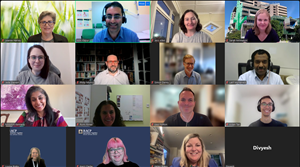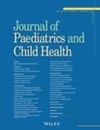Pot-pourri eBulletin - 23 May 2025

This is my last President’s Post for this newsletter. On 30 May 2025 I will conclude my term as President, Paediatrics & Child Health Division of The Royal Australasian College of Physicians. It has been such a satisfying chapter of my life, personally and professionally, and it is with immense pride and gratitude that I reflect on the past three years and all that we have achieved. There is too much to summarise here, and instead I invite you to visit the 2023-2025 eBulletins archived on the College website. I will come back at the end of this post to say more about my tenure; for now, I’ll recap recent PCHD events.
In April, the RACP issued a media release highlighting paediatricians’ serious concerns about shortages to ADHD medication and called for a national strategy to address this issue. In response, I was invited to participate in a Medicine Shortages Action Group (MSAG) meeting focused on methylphenidate shortages, which Dr Paul Hotton, Chair of the Chapter of Community Child Health, attended on my behalf. The PCHD will continue to monitor this space.
The PCHD is proud to have led the RACP endorsement of the Act for Children campaign, led by National Children’s Commissioner Anne Hollonds. This non-partisan initiative calls for stronger national leadership and accountability to improve outcomes for children and young people. Key priorities include a dedicated cabinet minister for children, a national plan for child wellbeing, and legislation to uphold children’s rights. We are pleased to stand with sector leaders in supporting this important work.
PCHD President-elect Dr Niroshini Kennedy attended the recent International Pediatric Association Conference (IPA) 2025, Mexico, as a panelist for the discussion Social Pediatrics - Migrant Children. A member of the IPA Standing Committee, Niroshini also represented the PCHD/RACP at the IPA Council of Delegates meeting held as an adjunct event to the annual conference. In recent years we have worked to maintain strong relationships with the international paediatric community, particularly in our local region, and it’s great to see this continuing as Niroshini transitions into the PCHD President role.
No PCHD President serves their term alone, and I have been extremely fortunate to have had Niroshini serve as President-elect during my time in this role. I want to record my sincere thanks and my certainty that the leadership of the PCHD is passing into very capable hands. I wish Niroshini and her incoming President-elect, Dr Paul Hotton, every success. I’m also very grateful for the support of my colleagues on the PCHD Council, and indeed all those who give generously of their time to contribute to the work of our PCHD committees.

As a last note, I want to express my thanks for all the support I have received from RACP staff during my Presidency. If I have been able to achieve much during my term, a debt is certainly owed to those who provided their assistance and expert advice. I would particularly like to mention by name the PCHD secretariat staff: Kerri Clarke, Leanne Harvey, and Engy Henein. I am grateful for their advice and support.
Professor Nitin Kapur
PCHD President
Several positions are available on PCHD committees. Please consider applying for suitable positions and/or encouraging your colleagues. If you have any questions about any of the PCHD committee positions, please contact Paed@racp.edu.au.
At the International Pediatric Association (IPA) Congress 2025, a global mission was launched: Protect every child, everywhere, with lifesaving vaccines by 2030.
More than 100,000 signatures have already been collected — and every signature brings us closer to:
- Achieving 90%+ vaccine coverage
- reducing hospitalisations and deaths
- creating a healthier future for children worldwide.
This pledge represents more than a statement — it’s a professional commitment to protecting children through immunisation.
Add your voice and help drive change. Sign the pledge and share it with your networks:
https://ipacongress.org/pediatrician-immunization-pledge.php
The Therapeutic Goods Administration (TGA) is currently seeking applications from professionals with relevant expertise in medicine and science, as well as from consumers with experience in consumer advocacy and perspectives.
Successful applicants will play a vital role in supporting the TGA’s regulatory functions by providing independent expert advice on a wide range of issues relating to medicines, vaccines, medical devices, complementary medicines, and other therapeutic products. Committee members provide input across the full therapeutic product lifecycle – from premarket evaluation to post-market safety.
Learn more about the committees and hear from current and past members at an upcoming information webinar. The webinar will also be recorded and made available on the TGA website.
Appointments and Remuneration
Committee members are appointed by the Minister for Health and Aged Care for terms of up to three years. Members receive a sitting fee as determined by the Remuneration Tribunal. These are part-time positions with the following approximate meeting frequency:
How to Apply
Applications must be submitted via the Department of Health and Aged Care jobs list by 11.30pm (AEST), Tuesday, 3 June 2025. Applications must include:
- a 1-page cover letter outlining your relevant expertise
- a current CV
- a short biography (max. 150 words)
- your committee preferences
- a signed ‘Declaration of interest’ form
- referee contact details
- your contact information.
New appointments will be finalised by December 2025, with terms commencing 1 January 2026.
For more information, visit TGA statutory advisory committees or email: committee.vacancies@health.gov.au

Did you complete an RACP Advanced, Faculty or Chapter training program between 1 May 2023 and 30 April 2023? If so, you are invited to complete this year’s New Fellow Survey to share your feedback of training and transitioning to an early career physician.
This online survey is anonymous and will take approximately 15-minutes to complete. Your feedback will help us provide tailored resources and support for members and make evidence-based improvements to our training programs.
Our New Fellow Survey was first introduced in 2021 and has been conducted annually since 2023. This year’s survey is open until Sunday, 22 June 2025 at 11.59pm AEST.
We thank our members who have participated in previous years, and we encourage all new Fellows, or those recently completing an additional RACP training program, to participate this year.
For more information about the survey, including confidentiality and how the data will be reported, please visit the New Fellow Survey page on the RACP website.
Thank you to our Fellows who have already participated in this year’s Survey.
Pharmaceutical Benefits Scheme (PBS) listings
New and amended Pharmaceutical Benefits Scheme (PBS) listings are available here. This information relates to the administration of these listings by Services Australia.
Avoid PBS authority delays – use online approvals
During peak times, the PBS Authorities phone line may have long wait times. To avoid delays, prescribers can use the online PBS Authorities system for faster approvals.
Did you know you or your delegate can prepare and save an authority request prior to you seeing your patient? You can then finalise the request and submit it for assessment during the consultation.
In the coming months Services Australia is working towards having all written PBS Authority required medicines accessible via the online PBS Authorities system.
For further information on broader PBS changes, please visit the PBS website.
Journal of Paediatrics and Child Health

The Journal of Paediatrics and Child Health publishes original research articles of scientific excellence in paediatrics and child health. The latest edition is now live and available to view online.
Some topics include:
-
Recent advances in the diagnosis and treatment of paediatric endocrine disorders
- The current landscape for screening and monitoring of early-stage type 1 diabetes
- X-Linked Hypophosphataemia and Burosumab: A systemic disease with a new treatment
Read the journal

There is evidence that six months or more off the job leads to some loss of practical skills and knowledge and certainly, for many doctors a loss of self-confidence. People take time out from medical practice for many different reasons but career breaks to raise children are more common than ever before. Paediatrics is one specialty where female representation exceeds 70 per cent and it is also becoming more common for new fathers to take leave as primary carers. Senior staff at Sydney Children’s Hospital have developed a day-long workshop to help medics brush off the cobwebs before they return to practice.
It involves rehearsal of specific skills, refreshers on calculation and interpretation tasks and a high-fidelity critical care simulation. Just as importantly, there is open discussion and mentorship to support the transition back to work. The program is called Paediatric Returnees after Maternity or Extended Leave (PRAM) this podcast was recorded during a live workshop at the Kids Simulation Centre, Randwick.
Workshop participants:
Elodie, Eliza, Emma, April, Stephanie, Lucy and Paula.
PRAM creators:
Dr Josephine Goodyer FRACP (Sydney Children’s Hospital, Randwick)
Dr Sasha Symonds FRACP FACEM (Sydney Children’s Hospital, Randwick)
Renee Byrne (Sydney Children’s Hospital, Randwick)
Please visit the Pomegranate Health web page for a transcript and supporting references. Login to MyCPD to record listening and reading as a prefilled learning activity. Subscribe to new episode email alerts or search for ‘Pomegranate Health’ in Apple Podcasts, Spotify, Castbox or any podcasting app.
Podcast Archive | RACP | The Royal Australasian College of Physicians
Did you know that you can update your address details online? Simply Login to MyRACP and go to “Edit my details”.
RACP Benefits: Exclusive savings on your lifestyle needs

Did you know that RACP Benefits gives you access to a range of discounts and offers from Australia and Aotearoa New Zealand’s leading brands and retailers? Simply log in to the portal to start shopping and saving today. These special deals are exclusive to the College and made possible by our benefits partner, Member Benefits Australia.
Log in or find out more.
Pomegranate Health podcast: Your contributions welcome
The RACP podcast, Pomegranate Health, has published over 100 episodes since starting out eight years ago.
To provide more frequent and focused content we’re seeking contributions from our speciality societies, committees and affiliated professional organisations.
To hear what this would sound like, listen to the episodes tagged [IMJ On-Air]
These episodes feature authors published in the Internal Medicine Journal being interviewed by the relevant section editor.
They have covered themes as varied as asthma management, hospital-acquired complications, causes of readmission and the JEV outbreak.
You already spend considerable time preparing lectures and webinars for your colleagues. Audio podcasts provide an easy way to reach thousands more around the world.
Each episode gets downloaded around 6500 times over the first 12 months from publication, with 21 per cent of listeners located outside of Australia and Aotearoa New Zealand.
All you need to do is to organise one or more presenters and an interviewer familiar with the material. The podcast producer will coordinate an online recording lasting about one hour and then edit it down before publication. The intention would be to ‘brand’ regular episodes from your specialty society or organisation in the same way that we’ve done with [IMJ On-Air].
Please send any questions or ideas to podcast@racp.edu.au
View all career opportunities on the RACP website.
To submit an article for publishing in Pot-pourri, please email paed@racp.edu.au. The article should be no more than 350 words. If you would like to submit an image with your article, it would be assumed that you have received appropriate permission to use the photo and it needs to be of high resolution, above 300 dpi. Please note that articles may need to be edited by the RACP Communications Team.